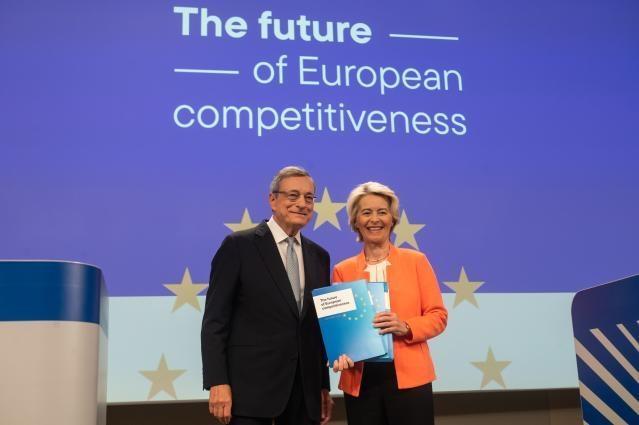
The Future of European Competitiveness report emphasizes that Europe’s current economic model is under pressure, requiring a new industrial strategy focused on three key areas: innovation, energy transformation, and security. Despite having a solid foundation through the Single Market and strong legal frameworks supporting social inclusion, Europe’s productivity is declining, widening the gap with the US and exposing vulnerabilities in global competition.
Innovation and digital technologies like artificial intelligence (AI) and cloud computing. The report identifies structural barriers, such as a static industrial structure and lower R&D investments compared to the US, which hinder disruptive technologies and scaling up innovative companies. To close this gap, the report calls for stronger EU-level coordination, increased public R&D funding, and an environment that supports startups, venture capital access, and the development of "European unicorns"—startups valued at over $1 billion.
Energy transformation. Europe faces high energy costs, exacerbated by the loss of Russian gas supplies, threatening its competitiveness. Decarbonization and transitioning to renewable energy are seen as essential for reducing costs and enhancing energy security. However, Europe must contend with competition from China, which has developed significant capacity in clean technologies. The report advocates for structural energy market reforms, improved permitting processes, and policies that ensure Europe captures industrial opportunities while protecting domestic industries from unfair global competition.
Security. Europe’s dependence on external suppliers for critical raw materials and technologies, especially from China and Asia, poses economic and geopolitical risks. The report stresses the need for a coordinated "foreign economic policy" that secures supply chains and strengthens strategic industries, including defense. Enhancing Europe’s defense capabilities and investing in sectors like space and technology are necessary to maintain autonomy and competitiveness.
Defence. Europe's defence industry suffers from fragmentation, with a lack of standardisation and coordination across member states. The report stresses the need for greater collaboration in defence procurement and the development of a unified European defence industrial base. Investments in defence technologies, including space, will be crucial to ensuring Europe's strategic autonomy. The defence industry is also seen as a critical area for technological innovation, with synergies between defence and other sectors like AI and aerospace
Transport. The transport sector will be heavily impacted by Europe's decarbonisation goals, particularly with the shift to electric vehicles (EVs) and low-carbon fuels. The EU’s decision to phase out internal combustion engines by 2035 implies a strong focus on EV production and battery technologies. However, the report warns of increased competition from China in the EV market, which may lead to significant job losses in Europe if local industries fail to adapt. To mitigate this risk, the EU must bolster its own clean tech manufacturing capacity and support innovation in sustainable transport technologies
Manufacturing. European manufacturing faces significant challenges due to competition from countries with lower costs, particularly China. The report stresses the importance of supporting industrial sectors through targeted policies that enhance innovation, streamline regulations, and create a level playing field. Decarbonisation will also impose additional costs on energy-intensive industries (EIIs), requiring significant investments in new technologies to meet carbon reduction targets. A strategic focus on innovation and local production will be crucial for Europe to maintain its manufacturing capacity
Bioeconomy & Health. The bioeconomy and health sectors are highlighted as areas where Europe can leverage its existing strengths in research and innovation. However, fragmentation in regulations and underinvestment in breakthrough innovations, particularly in pharma and biotechnologies, are seen as barriers to progress. The report calls for stronger coordination in R&D and better integration of digital health technologies, especially in using AI for drug discovery and healthcare delivery. A focus on building world-class innovation hubs is also recommended to drive growth in advanced therapy medicinal products and orphan drugs
The report further highlights the need for reforms in EU governance, recommending faster decision-making, better coordination between national and EU policies, and more efficient public investment in areas like digitalization, decarbonization, and defense. Specifically, the report provides guidance on how Europe can finance the significant investments needed to address main competitiveness challenges.
- Leverage both private and public sector financing: the private sector cannot bear most of the investment burden without substantial public support.
- Advance the Capital Markets Union to better mobilize household savings towards productive investments.
- Increasing productivity will create more fiscal space for public investments, emphasizing the link between productivity growth and financial capacity.
- Recognise the importance of common European funding for investments in public goods, such as breakthrough innovations, defense, and cross-border infrastructure.
- Develop Joint funding mechanisms, similar to those used for large-scale projects in the past.
Furthermore, reforming the EU governance could help improve coordination and reduce inefficiencies in spending, ensuring that resources are deployed more effectively. While national governments will continue to play a critical role, there will need to be deeper coordination between EU and national policies to ensure that the necessary investments are realized across the continent.
In this era of critical transformation, securing the right funding and strategic guidance is crucial for European industries and research actors to remain competitive and innovative. Ciaotech (part of the PNO Group) is a leading consultancy for EU funding and grants, uniquely positioned to help organizations navigate these complexities, accelerate growth, and unlock vital financial resources to drive future success.
Contact us to know more!

